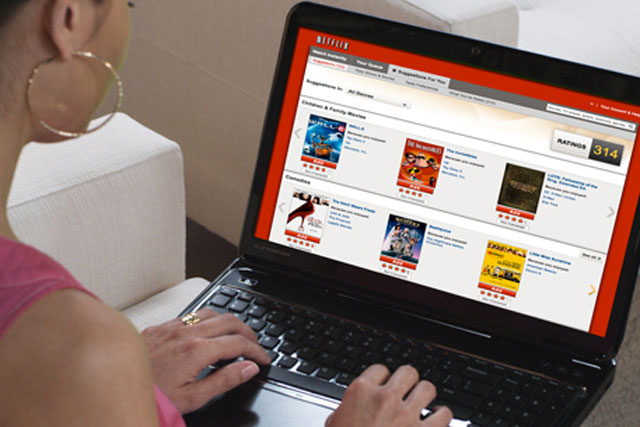
Natasha Joslin, data planning director at Lida, believes the problem Netflix faces is that its key target audience of tech and movies enthusiasts is potentially the hardest to reach, as they are likely to already be signed up to LoveFilm, Sky or Virgin.
Netflix is trying to get as many "test drives" as possible by broadcasting the offer of a month's free, no-commitment trial far and wide with TV, radio and digital ads.
Its steers people much more towards signing up via their Facebook accounts, than the alternative of using an email account.
The former's apparent advantage is it gives Netflix additional data without the effort of questioning people.
If you sign up via Facebook, according to the Netflix privacy policy, Netflix "will access information about you and your Facebook friends who also have a Facebook connected Netflix account on an on-going basis unless you disconnect" the Facebook and Netflix accounts.
It also tells members that it "may personalise or otherwise enhance your experience based on your Facebook information, such as your "Likes" and "Interests".
Sarah Stratford, strategy director at AIS, observes: "They've given themselves a real head start by integrating the service into such a rich source of interest data as Facebook."
In addition, Facebook friends are able to see you're a Netflix member, as well as content you have watched and rated (although you can tell it "not to share" individual pieces of content).
Because it helps get reach and awareness, says Kitcatt Nohr Digitas planning director Lazar Dzamic, the Facebook integration is "nifty", though Joslin cautions that people "are becoming more savvy as to how much they share with Facebook".
It's early days, but Netflix could also take a leaf out of LoveFilm’s early strategy of partnership marketing. "It was hard to escape a postal package from any major brand without a LoveFilm offer inside," Joslin points out.
Conversion and retention
While the free month upfront should attract plenty of interest, Netflix needs to convert triallists to subscribers and subscribers to brand advocates.
Clearly, the biggest draw is if it can better the quality and breadth of rivals' content, but its dexterity in getting to know its users will also be important.
It attempts this with a questionnaire during the sign-up process about your preferences for different film genres and moods, and what devices you own.
"They need to ensure they make access to content as easy as possible and keep themselves front of mind by providing strong content suggestions through the recommendations engine based on previous watching behaviour," Joslin says.
This is something that LoveFilm already has down pat, argues Dzamic. "They do a lot of recommendations based on my previous interests – they’ve borrowed some tried and tested practices from their parent company Amazon."
As a past LoveFilm customer, AIS's Stratford remembers the brand "rolled out offer after offer in an attempt to stop me lapsing".
Perhaps another disadvantage for Netflix is that by not collecting address data (unlike LoveFilm it does not rent films by post), it only leaves itself with email as a channel to deliver such offers.
Segmentation and database development
Assuming the launch is successful, the longer term plan for Netflix's UK team should be to increase the sophistication of its data strategy.
Luke Christison, head of multichannel marketing services at Acxiom, suggests, "Firstly, Netflix should ensure it understands its existing audience … it can then look at leveraging third-party data in the UK to identify ‘look-a-like’ consumers."
Dzamic's advice is that it put a significant amount of money into ramping up its data-mining operation, while Stratford believes it could focus on user tracking, following customers’ journeys to/from their site through digital space to better understand their content and media interests.
A good way of segmenting users would be by when and how often they watch films, says Joslin, who is less keen on segmenting them by genre, arguing most people will watch a lot of different things.
As its database builds in the coming weeks, Netflix staff will begin to see whether its initial blanket approach is establishing a beachhead that gives it that chance to start thinking about cross-selling additional offerings.
Follow Daniel Farey-Jones on Twitter

